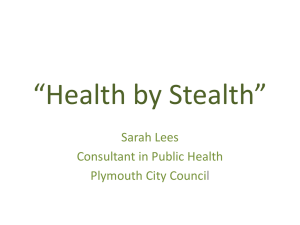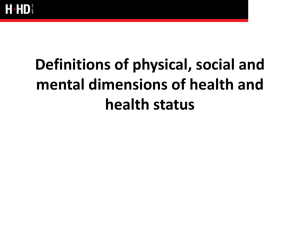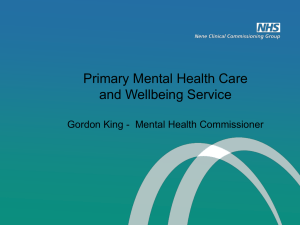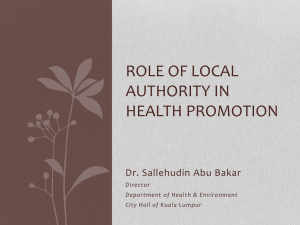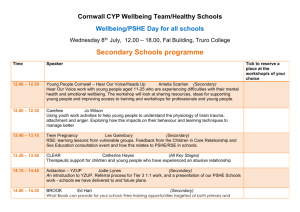Integrated Health and Wellbeing for Plymouth
advertisement
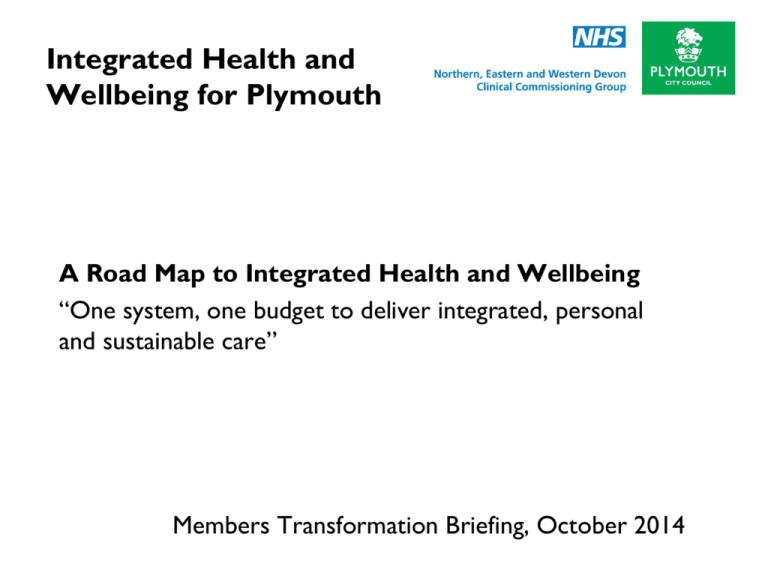
Integrated Health and Wellbeing for Plymouth A Road Map to Integrated Health and Wellbeing “One system, one budget to deliver integrated, personal and sustainable care” Members Transformation Briefing, October 2014 Context for Change Rising demand for services Service user/patient experiences of a fragmented service Implementation of the Health and Wellbeing strategy Severe budget pressures Significant health inequalities Requirement to focus on providing Best Start to Life Co-operative Principles and Values- “Rethinking Public Services” Better Care Fund Political Consensus • Integration Pioneers/Whole Person Care Council’s Context for ChangeInsights from co-production ‘We need pathways that start and finish with wellness’ ‘See me as a person – not a condition’ ‘I want healthcare that does not stop at the boundaries’ “Carers are vital” “Whole pathways-focus on whole person” “Don’t be constrained by current thinking” Integration Aims Integration through Transformation Integrated Health & Wellbeing Programme Integrated Commissioning Integrated Delivery Children & Young People Care Act 2014 Integration Principles “One system, one budget to deliver the right care, at the right time in the right place The health and wellbeing strategy will guide our future commissioning activity Commissioning and Services should be integrated and seamless wrapped around people not structured around organisational convenience Decisions taken should not be done in such a way to destabilise the other organisation Integration Outcomes Provide and enable brilliant services that strive to exceed customer expectations People will receive the right care, at the right time in the right place. Help people take control of their lives and communities. Children, young people and adults are safe and confident in their communities. People are treated with dignity and respect. Prioritise prevention A Sustainable Health and Wellbeing System Improved System Performance Integrated Health and Wellbeing Programme In July 2014 NEW Devon CCG and Plymouth City Council agreed to: Pool budgets via a Section 75 agreement Develop single commissioning strategies for Wellness, Community Based Care and Complex/Bed Based Care Work collaboratively to achieve an interim Commissioning function by March 2015 and achieve a fully integrated commissioning function new entity by March 2016. Develop Section 75 agreement to pool Adult Social Care and CCG budgets to facilitate the creation of a community health and social care provider Work with Plymouth Community Healthcare to develop options for integrated delivery of health and social care services in April 2016 Integration Video Integrating Delivery through Commissioning • Care & support will be integrated, co-ordinated around individual needs aiming to reduce use of acute care • Individuals who use services will be actively involved in the design of their care • Improved individual experience- more seamless care • Single community provider delivering improved local health and wellbeing • Shared commitment to common vision and goals • Improved ability to manage whole system, reduce duplication and wastage whilst managing variations in demand • Evidence based commissioning driven by integrated intelligence and information Integrated Health and Social Care Delivery Bringing together… Adult Social Care Plymouth Community Healthcare How will joined up services address these statements… “I want services that support me to manage my situation in life not just my condition” “I want the information I need to make healthy choices and stay healthy, and to have systems in place that can help me at an early stage to avoid a crisis” Information sharing protocol to be put in place to allow sharing of information across wider range of organisations. Workforce development to increase awareness of voluntary sector and universal services available to support individuals in the community. Workforce development to enable staff to support plan with individuals holistically. Workforce development to work together with a person to design their health and care needs support plan to best suit their needs Workforce development to ensure staff are up to date and able to promote telecare / telehealth as well as support them in accessing universal and information services. Care Co-ordination function in place to support individuals in managing their care Structured care and support plans that focus on meeting need and plan for any breakdowns System that provides support for carers Service accessible 24/7 capable of addressing crisis and able to put in place immediate short term support How will joined up services address these statements… “I want the ability to talk to a health or social care professional when I need to and to tell my story onceshare my information with colleagues” Single Front Door into community based health and social care Staff working from a joined up IT system approach Information sharing protocol to be developed to allow sharing of information across wider range of partners Single Assessment form that is owned by a localiy and that allows contibutors to update / add Access into service 24/7 at first instance “I want to be able to have services provided in lots of different places, at a time that suits, me having choice and control over the care I need” Locality model to be created around population need Access into service to be delivered through face to face visits, telephone assessments and in a clinical environment working in the best environment for the person “I want access to a range of services that support me and the people who care for me to lead a full and healthy life” Commitment to increase number of carer assessments and support Workforce training to identify and support carers earlier High Level Delivery Design 111 PCC Contact Centre Hospital GP Devon Referral Support Services Service Provider Voluntary Sector Single Access Point 24/7 Assessment Duty Desks Contact Centre Pathway Approved Mental Health Practitioners Home treatment Team Care Co-ordination Team District Nurse Out of Hours Support Team Rapid Response The principle for a single contact Assessment response service is for each individual to be identified As belonging to a locality community Or GP cluster. At the time of escalation of urgency of needs the city wide Rapid response function will address The immediate need as appropriate In a range of locations Single Access Point Functions Signpost access to universal services Arrange home visits Invite to/or arrange MDT review Organise care Pass to localities Locality Working and Case Co-ordination Organisation Geographic Boundary Principles To provide a co-ordinated care and support For individuals with health and care needs Maximising use of assistive technology to Promote health and wellbeing in a targeted and Personalised way DN Services Community Therapy Social Care GP Cluster Long Term Conditions Mental Health Teams Features MDT Working principles Patient population dashboards powered by Telehealth and telecare Shared assessment information Care act compliance Optimised usage of Case discovery and risk stratification tools Involvement in needs Assessment of for long term cases Individual annual reviews Enablers for Change Shared Care Records Single Assessment Shared Care Records Process Integrated IT Joined Up Budgets Workforce Development Operational Protocols and Procedures Robust Performance Management Info Shared Principles and Vision Community Benefits Easier and earlier access to services that promote wellbeing or that provide help in a crisis People empowered to take control of their own health and wellbeing Local communities in Plymouth are increasingly supported by strong links between GPs, schools, social workers and community organisations, which helps people like them to stay independent for longer. Older people who have come out of hospital are helped to stay at home. Families and carers will not have to chase professionals or ask them to talk to each other. Children with a learning disability and their families and carers are supported in managing their needs and can trust that when they turn 25 they will continue to receive the support they need. Developing social capital that enhances the lives of people in Plymouth through providing local resources that support a greater emphasis on prevention and early intervention. What will local people see as a result They will be able to help with designing the services they use They will have more care and support available at home They will have access to better information to assist them to manage their own condition When they contact services they will only need to describe their needs once The information they give to workers within the new system will be shared so that people can make their own choices They will be able to speak to a professional who can help them when they need support They will have the opportunity to take a lead in the on-going shaping of services for the future Learning from current integrated services Real life experiences: Following a fall in March, Mrs P was admitted to hospital. After her surgery she received support from the Care Co-ordination Team. A recent interview in The Herald noted that the care provided by the team was “wonderful”. Mrs P has experienced joined up care and support first hand and is really excited by the proposals to integrate all community health and social care services….
